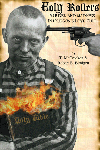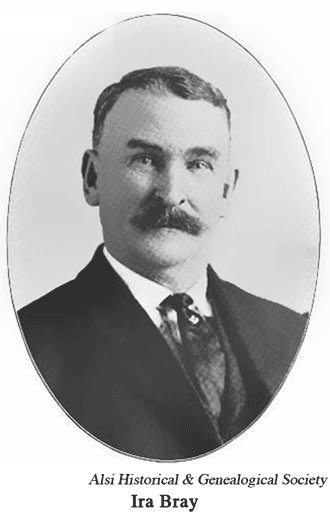
Attie Bray, Hattie Starr, Clarence Starr's wife, and Una Baldwin were three others of Creffield's flock who came from families that had homesteaded on the Coast Attie Bray was the first white child whose birth was recorded in the settlement of Ocean View. Her mother was Georgianah Starr, Sarah Hurt's older sister. Her father, Ira Bray, was terribly harsh with his five children. It was reported that he would eat candy in front them and tell them they couldn't have any because they were bad. When his sons would go hunting, he would only give them three gun shells. He would then belittle them if they didn't come home with at least one shell for future use, and complained bitterly that the makings for the shells had to be ordered from the east.
Hattie Starr was six in 1878 when her father, Thomas Baldwin, settled at the Devil's Bend in Bayview. Hattie said their first house there, a small Indian shelter, was so small she had to put her head out the window to brush her hair. The region was still so remote that when her eleven-year-old sister, Minnie died, she had been buried for two weeks before word reached her father in the Willamette Valley, where he was away on business.
Una Baldwin's parents were Edwin Baldwin, another of Thomas Baldwin's children, and Victoria Ruble. Victoria's parents, David and Orlena Ruble, are considered the founders of Waldport. In 1884 President Arthur issued David Ruble a platt for Waldport, and he proceeded to lay out the town's streets. Having no transit, he used the stars as his guide. The town of Waldport, its wooden sidewalks always covered with windblown sand and with wagons mired on barely navigable streets, was built on a sand spit that had been an old Indian burial ground. Graves could be found everywhere in Waldport. If a body was covered, it had been covered by Mother Nature, for coastal Indians did not cover their dead with earth. To do so, might make it difficult for the Spirit to go free.
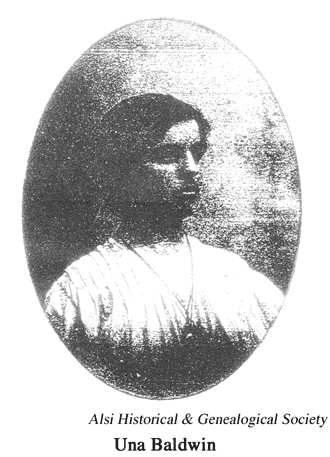 If a body was placed in a coffin, it was
buried with the top level with the ground, and loose
hand-split shakes were put over it. A man's silver coins
were put in his mouth, and his paper currency was placed
under his shoulders. If a man owned a canoe, his body, along
with some of his belongings, was put inside, and loose
shakes were put over it. If a man owned two canoes, the
second one was put over the first upside down. Many of these
tombs could be found among the bull pines and salal bushes,
and animals preyed on the bodies. Remains were scattered
about, and it was not uncommon for the barefoot children of
homesteaders to overturn a rock with their toe, and to
discover that the rock was a human skull.
If a body was placed in a coffin, it was
buried with the top level with the ground, and loose
hand-split shakes were put over it. A man's silver coins
were put in his mouth, and his paper currency was placed
under his shoulders. If a man owned a canoe, his body, along
with some of his belongings, was put inside, and loose
shakes were put over it. If a man owned two canoes, the
second one was put over the first upside down. Many of these
tombs could be found among the bull pines and salal bushes,
and animals preyed on the bodies. Remains were scattered
about, and it was not uncommon for the barefoot children of
homesteaders to overturn a rock with their toe, and to
discover that the rock was a human skull.
Baldwin built a sawmill in the early 1880s. He brought the boiler and engine from Yaquina Bay on a sled pulled by one ox along a narrow Indian trail. Much of the time the trip took was spent widening the trail to accommodate the sled. The lush primeval forest on the coast had thousand-year-old trees that were hundreds of feet high and tens of feet thick. In some places the vegetation was so dense that it was dark even under a bright midday sun. Most of the loggers who came to fell these trees were from New England and the Midwest, and brought with them knowledge of bull teams, caulk boots, and cuss words.
They worked from dawn to dusk for about a dollar a day and lived in crowded bunkhouses that were dark and smelled of wool clothing drying, wood burning, sweat, kerosene, well-used spittoons, and whiskey. Turnover at logging camps was high. There was an infinite number of reasons men gave for leaving--weather too hot, weather too cold, lumber too heavy, pay too light, grub too greasy, coffee too weak, too many Swedes, too many Finns, too many of the boss's relatives in crew, too far from Portland, too close to Portland, timekeeper crooked, and flat beer in the local tavern.
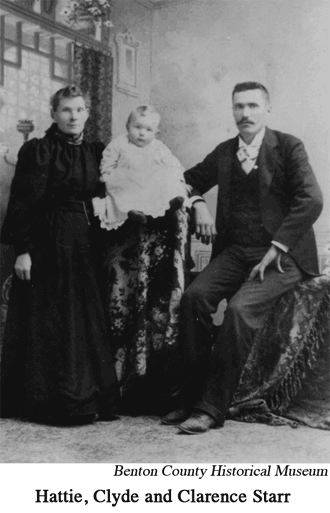 A cannery was also established on the
Alsea Bay. The fish were so plentiful, it was said, that
they practically jumped into the fishing boats by
themselves. When the salmon were running, Chinese laborers
came to work in the cannery. They brought with them all the
supplies used in the process, including the sheets of tin
that they made into cans. The canners worked fast because
there was no refrigeration. By the end of the day, some fish
at the bottom of barrels were on the soft side. Fish not
canned the day they were brought in were discarded or buried
in yards and used as fertilizer.
A cannery was also established on the
Alsea Bay. The fish were so plentiful, it was said, that
they practically jumped into the fishing boats by
themselves. When the salmon were running, Chinese laborers
came to work in the cannery. They brought with them all the
supplies used in the process, including the sheets of tin
that they made into cans. The canners worked fast because
there was no refrigeration. By the end of the day, some fish
at the bottom of barrels were on the soft side. Fish not
canned the day they were brought in were discarded or buried
in yards and used as fertilizer.
In some ways, for the day and age, the hundred-odd people who lived in Waldport were open minded. One of their most respected citizens was Louis Southworth, a black man. At the time, it was for all intents and purposes illegal to live in Oregon if you were black. A law forbidding slavery was passed in 1844, but the same law said that if free blacks remained in the state for more than three years, they were to receive up to thirty-nine lashes on the back once every six months until they left.
"Jim [Doty, a nearby homesteader] and I were the first two white men on the bay," Southworth was fond of saying. Southworth was born as a slave in Kentucky, brought to Oregon in 1851, and later purchased his freedom with gold he dug out of Yreka and Jacksonville mines.
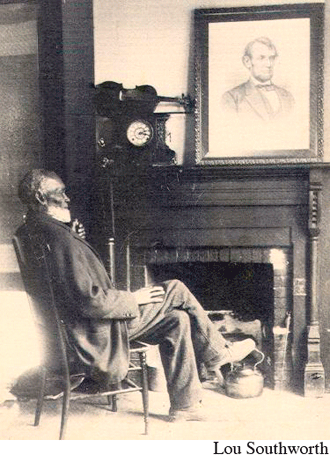 There is no record of when the first
preacher came to the town. Early church services were held
out of doors, with benches made out of drift logs pushed
together and planks laid across them. As the population
grew, so did the number of itinerant evangelists.
There is no record of when the first
preacher came to the town. Early church services were held
out of doors, with benches made out of drift logs pushed
together and planks laid across them. As the population
grew, so did the number of itinerant evangelists.
In 1882, David Ruble donated a lot in Waldport for a community church. He said it was to be nonsectarian, but stipulated that neither a Catholic nor a Mormon could preach in it.
At one point a small settlement of Mormons lived up nearby Drift Creek. A schoolteacher there, Joe Gideon, caused a small sensation when it was learned he was teaching the Mormon children the world was round. One women said to her neighbor: "But, of course, I tell mine different when they get home."
Lou Southworth's happiness for a long time came from going to church, where he played his violin. Then his name was dropped from its roll.
- The brethren wouldn't stand for my violin, which was all the company I had most of the time [Southworth said wistfully]. They said it was full of all sorts of wicked things and that it belonged to the devil. I inquired if there's music up in heaven and they told me that there is. But when I asked them if I could play a little of it here below, they couldn't answer that to suit a fellow like me. And it hurt me a good deal when they told me that playin' a fiddle is unbecomin' to a Christian and the sight of the Lord. So I told them to keep me in the church would be with my fiddle. I couldn't think of parting with my old friend.
- They turned me out, and I reckon my name isn't written in their books any longer. But I somehow hope it's written in the big book up yonder in the land of golden harps where they aren't as particular about an old man's fiddle. And sometimes I think that when you go up yonder and find my name, to your surprise in the big book, you'll meet many a fellow who remembers the old fiddler who played Home Sweet home, Dixie Land, Arkansas Traveler, Swanee River and other tunes for the boys who were far away from home the first time. And they'll talk over the days where there was no society for men like out West; when there wasn't any Bible and hymn books were unknown; when play' poker and buckin' faro were the only schooling a fellow ever got; when whiskey ran like water and made the whites and Indians crazy; when men didn't go by their right names and didn't care what they did. And when they talk over those early days, the fellows will say, "Where you all been and what'd we all done in the mines but for Uncle Lou's fiddle, which was most like a church of anything we had?" For the boys used to think the good Lord had put a heap of old-time religion music into my fiddle and the old-time religion music is good enough for an old man who's done some mighty hard work in his eighty-five years.
-
Chapters from
Holy Rollers: Murder & Madness in Oregon's Love Cult
Part 1: The Seduction
Chapter 1: Trust Me, Brothers And Sisters
(Life Before Creffield [B.C.])
Chapter 2: God, Save Us From Compromising Preachers
(Creffield's Preachings)
Chapter 3: The Flock
(Profiles of the Holy Rollers Were)
Chapter 4: The Holy Rollers
(Things Start to Get Wild on on Kiger Island)
Chapter 5: Housecleaning
(There's a Sacrificial Bonfire)
Chapter 6: Community Concerns
(Officers Visit)
Chapter 7: Esther, The Chosen One
(Creffield Plans to Marry 16-Year- Old)
Chapter 8: Tar and Feathers
(The Men of Corvallis Act)
Chapter 9: Sane People Don’t Go Bareheaded
(Holy Rollers are Committed to the Asylum)
Chapter 10: More Beast Than Man
( Creffield is Arrested)
Chapter 11: God Will Plead Creffield's Case
(Creffield in Court)
Chapter 12: Scandal
(Shocking Testimony at the Trial)
Chapter 13: Calm Before the Storm
(The Holy Rollers Resume their Lives)
Chapter 14: Giving Up The Ghost
(Men are Gunning for Creffield)
Part Two: The People V. Creffield
Chapter 16: The Widow Creffield
Chapter 19: An Inherited Streak of Insanity
Part Three: The Madness
Chapter 23: Seeking Reconciliation
Chapter 24: Another Holy Roller Page One Murder
Chapter 25: What Can Papa Do For You?
Chapter 26: Human Life is Too Cheap In This Community
Chapter 30: The Final Chapter
(What Happened to Everyone Afterwards)
The Epilogue
(Heaven's Gate)
Chapter of Holy Rollers where much of the action takes place in Waldport
Chapter 14: Men are Gunning for Creffield
